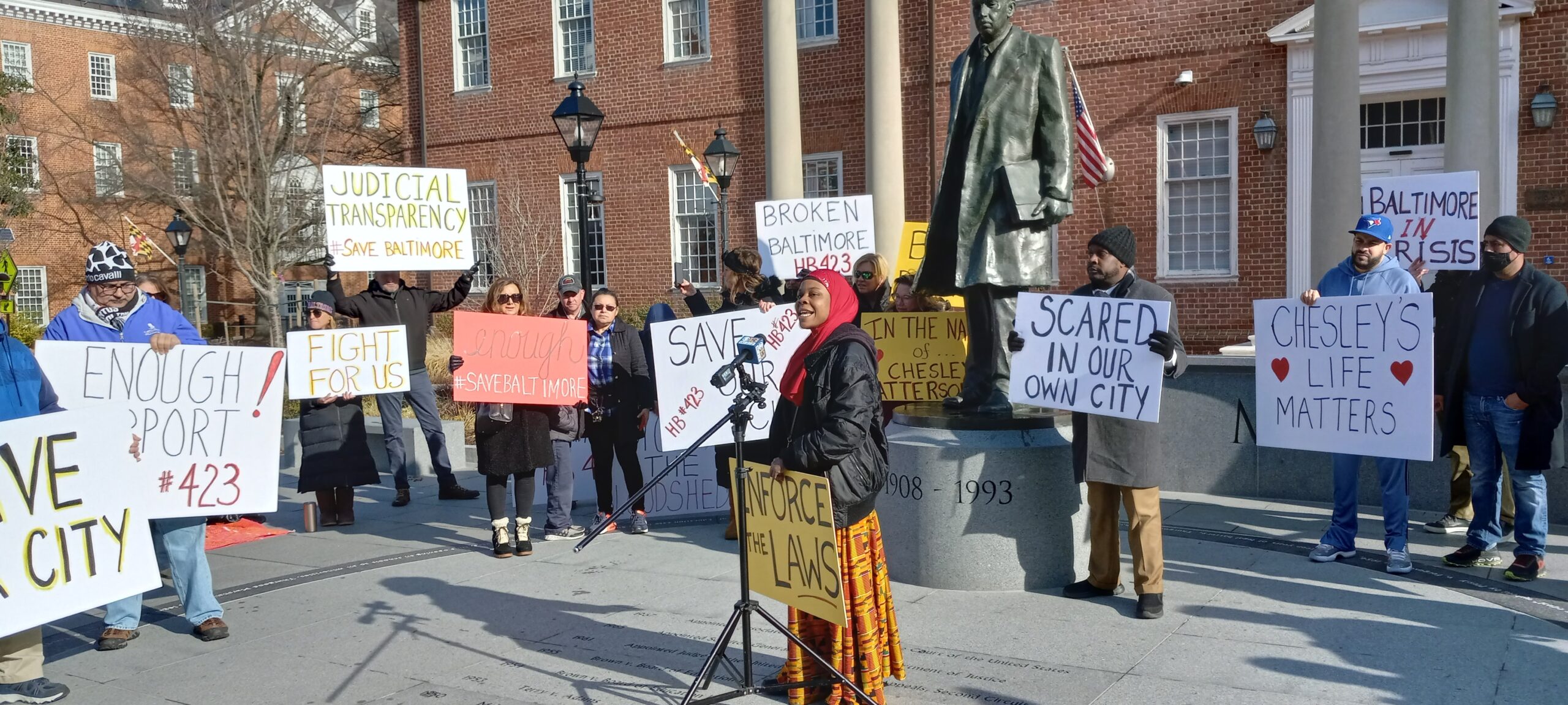Hogan Pushes Again for Judicial Transparency Act, Harsher Sentences on Repeat Gun Crimes

Maryland’s House Judiciary Committee heard testimony Tuesday on a pair of emergency bills introduced by Gov. Lawrence J. Hogan Jr. (R) that would publicize judicial sentencing data and impose harsher sentences for repeat firearms violations.
The panel’s consideration is key to the future of Hogan’s primary proposals for fighting increasing violent crime in the state. Previous iterations of the bills have gained some traction in the Maryland Senate, but have failed to pass the House committee.
Republicans have faithfully backed Hogan’s crime bills — members of the minority party from both chambers have signed on to cosponsor both pieces of emergency legislation.
Last week, Senate Democrats announced that they are looking to a different approach to public safety that includes prevention, intervention, criminal justice and rehabilitation.
In the meantime, Marylanders are asking lawmakers for solutions, as evidenced by a group of people gathered outside of the State House on Tuesday morning in support of the governor’s crime package.
Crime has risen across the state. Murders in Baltimore have surpassed 300 for the past seven years, a statistic that has figured heavily into legislative debate.
As of Tuesday afternoon, the Baltimore Sun’s Homicide Database reported 39 homicides in Baltimore in 2022.
“We have reached a crisis point not just in Baltimore, but nationally as well,” Kieffer Mitchell, Hogan’s chief legislative officer, said during the bill hearing Tuesday. “If we’re going to get a handle on the rampant violence, we must work together to get repeat violent offenders off of our streets.”
In keeping with his practice, Hogan did not attend the hearing to personally present the bills in the committee where they have stalled in recent years.
Mitchell presented The Violent Firearms Offender Act of 2022, or House Bill 423, which would increase the length of sentences and impose mandatory penalties for people who have been repeatedly convicted of firearms offenses or have been caught with illegally possessed guns.
It also increases penalties for suppliers who give guns to people convicted of repeat firearms offenses.
Previous iterations of Hogan’s emergency legislation have passed out of the Senate chamber. In 2020 the bill died in the House chamber and it was taken up too late during the 2021 session to move forward.
The governor also introduced this bill during the 2021 special legislative session, when lawmakers exclusively focused on redistricting and veto overrides.
Testifying in favor of the bill were members of the Maryland State’s Attorneys’ Association and deputy state’s attorneys from Harford and Baltimore Counties who said the bill sent a message that gun offenses would be dealt with harshly.
Witnesses who signed up in opposition to the bill were not present when called to testify during the virtual hearing.
Hogan’s other bill, the Judicial Transparency Act of 2022, would require a comprehensive annual report on the sentencing decisions for violent crimes by individual judges, including details on sentences outside of the Maryland Sentencing Guidelines.
Hogan introduced iterations of this bill during the 2019 and 2020 sessions and the 2021 special session.
The 2019 and 2020 bills never made it out of the House Judiciary Committee.
Mitchell expressed thanks to House Judiciary Committee Chair Luke H. Clippinger and House Speaker Adrienne A. Jones (D-Baltimore County) for establishing the House Workgroup on Judicial Transparency, which was created in response to Hogan’s frustration after his bill was tabled in late 2021.
Mitchell said that the legislation seeks to bring transparency and accountability to all three branches of state government.
“As legislators, each of the votes you take, floor votes, committee votes — even committee amendments — are made available to the public,” he said. “The decisions made by public officials in our judicial system, in whom we trust our safety and our liberty, should fall under the same standards of transparency.”
Baltimore City Circuit Court Judge Shannon E. Avery, who sits on the Maryland Sentencing Commission, said that the sentencing guidelines “have always been expressly voluntary and were never intended to impose mandates on judges with regard to criminal sentencing.”
Erin Chase, a deputy legislative officer for Hogan, called the bill a “holistic approach” to tackling the state’s “historic” rate of violent crime.
According to Chase, the Sentencing Guidelines Commission already publishes most of the data required under this bill by circuit court “but by expanding the reporting requirements, Marylanders will have access to information that will better help them understand the judicial branch and how sentences are being determined,” she said.
Maryland District Court Chief Judge John P. Morrissey opposed the bill.
He said that sentencing for similar charges can vary widely, and to evaluate a judge’s decisions based on raw numbers would be inappropriate.
“If the question is asked what this data would do if released, it seems likely that it would be used to criticize a judge that, depending on current settlements, could be that that judge was too tough on crime or not tough enough,” Morrissey said. “But we’re really not supposed to be tough on crime or lenient on crime.”
“We’re supposed to be fair and to apply the law to the unique facts of each case,” he added.
The Judicial Transparency Act of 2022 will be heard in the Senate Judicial Proceedings Committee Thursday. The Violent Firearms Offender Act of 2022 will receive a Senate hearing next week.
Editor’s Note: This story was updated to correct the description of the Judicial Transparency Act. The bill would require a detailed report about sentences outside of Maryland’s sentencing guidelines, but would not prohibit judges from imposing any sentence.




 Creative Commons Attribution
Creative Commons Attribution